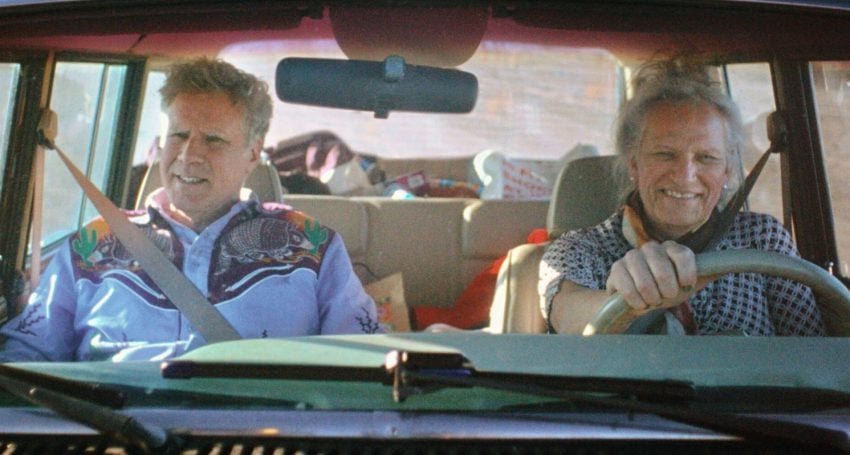Will & Harper
Films & TV
Jonathan Sargeant reviews a documentary featuring Will Ferrell and Harper Steele on a road trip as old friends reconnecting with a new dynamic — Steele has transitioned since they last spent time together

Will Ferrell is an American comedian and actor well known to many. His career includes many beloved films, including Elf, Anchorman, Talladega Nights and beyond. His social cachet in the US is significant. Probably less known to Australian audiences is his start in show business on television’s Saturday Night Live — which is immensely popular in the US and still on-air in its fourth decade. Ferrell debuted there as a fresh-faced funny guy in 1995, quickly establishing himself as a key player in the skits-based show. Of course, central to his success were the writers behind the scenes and key among them was Harper Steele. Except Harper wasn’t Harper at that point. Many decades under a former name, in what outwardly appeared to be a successful life, hid turmoil and anguish, a sense experienced from childhood of being born in the wrong body.
Once Harper sent emails to friends describing her transition, Ferrell’s supportive response was that the two should road trip across the US, following a path set by Harper taking in many significant places she frequented in her own road trips of bygone years. The question posed by this documentary concerns how she as her true self would be received there — she notes early on, “I love this country so much; I just don’t know if it loves me back right now.”
If all of this feels a little constructed, it certainly is. It’s the nature of documentaries to set the direction of the narrative quickly, especially in character pieces like this one. The film unfolds with a series of stops along the way, from dive bars to steak restaurants, the Grand Canyon to basketball games. Perhaps surprisingly, moments of less than welcome acceptance are few and far between. They do happen — there are misgenderings and hateful online messaging — but the trip unfolds to reveal a different story. The journey provides the structure, but the narrative threads are vignettes of the friendship between these two and the ways warmth and acceptance are expressed through vulnerability and genuine curiousness.
Advertisement
As they settle into the front seats a few minutes into the film, Harper says no questions are off the table and Ferrell steps up for this. That these enquiries seem so staged reveals editing that might have done better to disguise the format. Having said this, the authenticity of Ferrell’s wondering and concern for his friend eclipse that issue mostly. Instead, we see a tender gentleness in which the comedian’s celebrity often lubricates social situations, perhaps insulating the two from more obvious antagonism.
Maybe because of this, Harper asks Ferrell to wait outside one venue so that she can make her own way with those inside. That leads to a lovely moment with First Nations people serenading her with an Indigenous American tune, touching, as it suggests, that true core identities are being connected all around.
Viewers put off by Ferrell’s screen personas may note that this is not a series of awkward jokes or one-liners. The film has moments of humour, but it is significant that more emphasis is given to the deep rapport the two share. Comedians sometimes report fearing pressure to be constantly “on” and that is not apparent here. In fact, the one incident where Ferrell tries an intentional comedy dress-up at a restaurant is the one moment that turns sour, but even this is a chance for the two to console and care for each other.
Advertisement
As the film rolled on, I found myself hoping for some more challenging moments. The realities of living as a trans person in a country where, state by state, laws are increasingly being passed to make such life difficult is barely touched. Not that there aren’t deep moments of joy, love and anguish, but the film intentionally chooses not to be polemical. Upon reflection, I think this may be its greatest strength — for audiences who haven’t had the privilege to listen to a trans person share about their personal circumstances, this documentary humanises the wonderfully goofy, delightfully prickly, always insightful Harper in ways that direct assertions might not have. Her own hard-won true humanity and the deep care her friend shows for her are the two poles of a film that has the potential to win both hearts and minds. As the credits roll, we see a montage of unshown moments from the trip and I found myself keen to spend more time amongst the authentic, beautiful friendship of Will & Harper.
Will and Harper is currently streaming on Netflix
Editor’s note: Interested in learning more about film, the Arts, and the many intersections with life and faith? Jonathan Sargeant is teaching DA2013Z/DA9013Z God and Contemporary Culture: Theology and the Arts in Semester One 2025. Please contact Jonathan Sargeant for more information via jonathan.sargeant@anglicanchurchsq.org.au.






